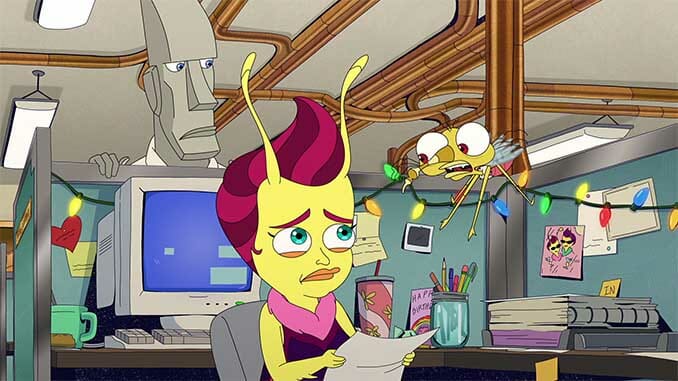Big Mouth Spinoff Human Resources Is Big, Bawdy, and Surprisingly Emotional
Photo Courtesy of Netflix
The idea of personifying parts of the human experience, the urges and impulses that make us human, is a time-worn tradition; since time immemorial human beings have given living form to feelings, urges, and vibes, telling stories about gods and demons that convinced, helped, or tricked us into action. Netflix’s Big Mouth applied that concept to the experience of going through puberty, with the writers working out some of their past experiences through the lens of what they imagine it might be like for today’s youth. But new series Human Resources, a spinoff of Big Mouth, is both more mature and more emotional. It also mostly deals with the interior lives of adults.
Created by Jennifer Flackett, Andrew Goldberg, Nick Kroll, Kelly Galuska, and Mark Levin, Human Resources (like its predecessor) focuses on the Hormone Monsters of Big Mouth who serve as the primary nonhuman guides. But here, their relationships with humans take a backseat to their relationships with each other. That also means that other nonhuman creatures like the Shame Wizard (voiced by David Thewlis) and Depression icon Kitty Dukakis (Maria Bamford) get the space to become more than just villains.
Human Resources’ main protagonist is Emmy (Aidy Bryant), an alcoholic slacker assistant Lovebug who is thrust into the job of facilitating human affection and compassion after taking over for Becca (Ali Wong), the star client of Sonya (Pamela Adlon), one of the two Lovebugs that Big Mouth introduced in Big Mouth Season 5. The other returning Lovebug, Walter (Brandon Kyle Goodman), takes Emmy under his proverbial and literal wings while she competes with and tries to escape the shadow of her more successful friend and coworker, Rochelle (Keke Palmer), and navigate an unhealthy relationship with Dante the Addiction Angel (Hugh Jackman).
-

-

-

-

-

-

-

-

-

-

-

-

-

-

-

-

-

-

-

-

-

-

-

-

-

-

-

-

-

-

-

-

-

-

-

-

-

-

-

-








































